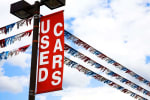Used Car Dealers
Automax AtlantaAbout
Important information
- Additional Info:Are you in the market for a new or used car? Or perhaps you are looking for a truck, SUV, van or motor home? You can save yourself a lot of money and problems by doing your homework, investing some time and paying attention to the important details.
Please read on to learn how to be a wise and informed buyer.
Step 1: Prepare in advance
Research automotive and consumer magazines, sales literature and Internet websites for information on product quality, reliability and performance.
Attend an auto show to look at vehicles for appearance, size, controls and features.
Test drive the makes and models of the vehicle that interest you to check performance and make sure you like them. (DON'T bargain or negotiate at this point.) You can even rent a car for one day.
Read consumer magazines, pricing services and websites for pricing information, trade-in values and negotiating tips.
Determine how much you can afford to pay, based on the total cost of the vehicle - taking into account sales tax, interest rates and the length of the loan. Many loan calculators or amortization tables are available online. Be sure to include any rebates and the trade-in value of your current vehicle.
Consider whether you may be able to get more money for your trade-in by selling it yourself instead of trading it to the dealer, who might only offer you its wholesale value.
If possible, arrange financing in advance through your bank or credit union. If you don't have a favorable credit rating and can't prearrange financing, you may have to make larger down payments and pay a higher interest rate.
If you are "upside down" on your trade-in (you owe more on your car than it's worth as a trade-in), think carefully about whether now is the best time to buy another vehicle. Any amount you still owe on the trade-in will be included in the loan for your new purchase, and this might perpetuate the cycle when the time comes for your next trade-in.
It may also subject you to less attractive lending terms or require the purchase of "GAP" insurance to protect the lender's interests. What's more, even though a dealership agrees to pay off your existing loan, there is no guarantee that it will do so, as may occur with a business that is dishonest or is having financial difficulties. If that happens, you are the one responsible for making payments on that loan. Read more about what you can do if you find yourself in that situation.
View advertising with a cautious eye. Pay careful attention to the exact wording of the ad before rushing to the dealership, and do not make assumptions. Look for fine print, asterisks, limitations or conditions to the offer. Remember: "If it sounds too good to be true, it probably is."
Select two or three dealerships for comparison shopping, based on location, prior personal experience, recommendations of friends or relatives, and sales policies. (Does this dealership negotiate or haggle over the sale price or trade-in value? Are they a "one-price" operation with a fixed price for their vehicles?)
Websites with Product Information
www.autosafety.org (safety and mechanical defects, complaint history, class action information)
www.nhtsa.gov (safety defect and recall information, crash test results)
www.carfax.com (vehicle history reports)
www.autocheck.com (vehicle history reports)
Websites with Pricing and Negotiating Tips
www.carbuyingtips.com (negotiating and financing tips, plus many useful links)
www.edmunds.com (new and used car pricing, reviews and information )
www.kbb.com (new and used car pricing, reviews and advice)
www.nadaguides.com (new and used car pricing, other information, links)
www.ebaymotors.com (vehicle auctions, dealer links, comparison shopping)
www.autotrader.com (vehicle sales and auctions, comparison shopping, links)
www.carprices.com (new and used car pricing, loan calculators, research information)
Step 2: Shopping and negotiating
Take your time. Don't be rushed or get caught up in "new car fever." You'll have to work to get a good deal, so be prepared to spend the necessary time and energy.
Don't give in to pressure tactics. Do NOT sign a buyer's order or place a deposit during negotiations. Do this AFTER you have comparison-shopped and decided what to buy. A dealer who really wants to sell you that vehicle should be willing to hold the offer open for a day or two while you compare and decide.
Check out the vehicle thoroughly. This is very important, because all vehicles are sold AS IS unless otherwise specified in writing. "As is" means NO warranty, and verbal promises may not apply. Unless you have a specific written promise or purchase a service contract, the seller may not be liable for any problems the vehicle has, or for any repairs it may need, once you sign a purchase agreement.
For a new car, you should not only take it for a test drive, but also do a thorough walk-around inspection and ask plenty of questions about anything unusual (such as more than 50 miles on the vehicle, or claims that the car was a demonstrator or executive car.) Since dealers are not required to disclose prior damage, even on new vehicles, unless the damage exceeds a certain dollar threshold, be sure to inquire specifically about any prior damage.
For a used car, additional steps are recommended, including a check of the vehicle's history and a professional examination by a qualified mechanic or body repair technician. Some online services check official records for a fee and will generate a report on the vehicle's accident history or prior odometer mileage readings. (Read about Odometer Fraud.)
Pre-purchase inspection services that professionally examine and road-test vehicles at a cost of about $100 are increasingly common, and many mechanics, service centers and body shops will also inspect cars for a reasonable price.
Pay attention. Stay focused on the details of what the seller is offering or proposing. Ask follow-up questions such as, "Does that price covers everything, including rebate, sales tax and dealer fees?"
Separate the deal into key parts. Keep the main components distinct, so that you can consider and maintain your options. Negotiate 1) the purchase price, 2) the trade-in value and 3) the financing or monthly payments, separately and in that order. Then you can choose whether to trade your old vehicle or sell it yourself, and whether or not to finance through the dealer.
If you do not discuss these items separately, confusion can result, as changing one item may also change others. For instance, the monthly payment amount may go down, but the contract is changed from a purchase to a lease; the trade-in amount may be increased, but the purchase price also goes up; or the monthly payment goes down, but the interest rate and length of loan are extended.
Step 3: Closing the deal
Be sure before you sign! Unlike some other purchases, there are few remedies for car-buyer's remorse (that is, changing your mind). Contrary to a popular rumor, there is no cooling-off period or statutory right to cancel a vehicle purchase contract, and in fact very few dealers will agree to allow you to cancel. In essence, once you have signed the contract, you have bought the vehicle, even if you haven't yet driven it off the dealer's lot.
Get it in writing. Price offers or verbal promises have little or no value if they are not put in writing. Be aware that a buyer's order usually states that the dealership is not bound by a price quote even if it is written, unless it is signed by a manager rather than a salesman. Also, most contracts state that the dealership is not responsible for any verbal promises or representations not included in the contract itself. Make sure that all such promises, including items or options to be delivered later, are put into the contract before you sign it. This might include floor mats, striping, a stereo/audio system, an alarm system, or special wheels or tires.
Don't buy what you don't want or need. Additional options (such as paint sealants, additional undercoating, fabric treatments, anti-theft parts etching, and alarm and navigation systems) and additional services (such as extended warranties or service contracts, routine maintenance packages, credit life or credit disability insurance) do have value but, like any other item, they should be comparison-shopped and carefully considered. Be especially wary if the dealership tells you all their cars must have paint sealant or etching applied, or that a service contract can only be obtained at the time of purchase.
Read every document before you sign. Unfortunately, most people don't follow this advice, but it is the best way to avoid problems, especially concerning the terms of the deal or special promises or considerations.
Don't take delivery of the vehicle until your financing is approved. (See Say No to Spot Delivery.)
Get copies of the most important documents before you leave. Don't wait for them to be sent by mail. Ask for copies of your buyer's order or bill of sale, any finance agreement, Lemon Law Rights Statement (for a new vehicle) and the odometer mileage disclosure form.
...and finally, when you have followed all of these tips and purchased your new or "like-new" vehicle, enjoy your pride of ownership, and please drive carefully!
BBB Business Profiles may not be reproduced for sales or promotional purposes.
BBB Business Profiles are provided solely to assist you in exercising your own best judgment. BBB asks third parties who publish complaints, reviews and/or responses on this website to affirm that the information provided is accurate. However, BBB does not verify the accuracy of information provided by third parties, and does not guarantee the accuracy of any information in Business Profiles.
When considering complaint information, please take into account the company's size and volume of transactions, and understand that the nature of complaints and a firm's responses to them are often more important than the number of complaints.
BBB Business Profiles generally cover a three-year reporting period. BBB Business Profiles are subject to change at any time. If you choose to do business with this business, please let the business know that you contacted BBB for a BBB Business Profile.
As a matter of policy, BBB does not endorse any product, service or business. Businesses are under no obligation to seek BBB accreditation, and some businesses are not accredited because they have not sought BBB accreditation. BBB charges a fee for BBB Accreditation. This fee supports BBB's efforts to fulfill its mission of advancing marketplace trust.




